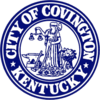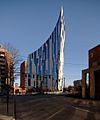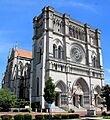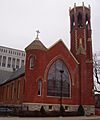Covington, Kentucky facts for kids
Quick facts for kids
Covington, Kentucky
|
||
|---|---|---|
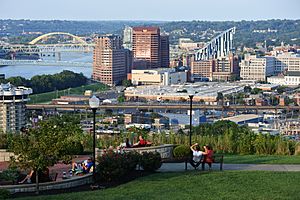
Downtown Covington skyline
|
||
|
||
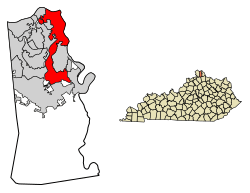
Location of Covington in Kenton County, Kentucky
|
||
| Country | United States | |
| State | Kentucky | |
| County | Kenton | |
| Founded | 1815 | |
| Government | ||
| • Type | Commission-City Manager | |
| Area | ||
| • Total | 13.76 sq mi (35.63 km2) | |
| • Land | 13.20 sq mi (34.18 km2) | |
| • Water | 0.56 sq mi (1.45 km2) | |
| Elevation | 719 ft (219 m) | |
| Population
(2020)
|
||
| • Total | 40,961 | |
| • Estimate
(2022)
|
40,956 | |
| • Density | 3,103.81/sq mi (1,198.42/km2) | |
| Time zone | UTC−5 (EST) | |
| • Summer (DST) | UTC−4 (EDT) | |
| ZIP code |
41011-41012, 41014-41019
|
|
| Area code(s) | 859 | |
| FIPS code | 21-17848 | |
| GNIS feature ID | 2404138 | |
| Website | covingtonky.gov | |
Covington is a city in Kenton County, Kentucky, United States. It sits where the Ohio River and Licking River meet. The city is just south of Cincinnati, Ohio, across the Ohio River. It is also west of Newport, Kentucky, across the Licking River.
In 2020, Covington had about 40,691 people. This makes it the biggest city in Northern Kentucky. It is also the fifth-largest city in the whole state. Covington is part of the larger Cincinnati metropolitan area. It is one of two county seats for Kenton County, along with Independence.
Contents
History of Covington
Covington was founded in 1815. Three men bought land where the Licking River meets the Ohio River. They named the new settlement after General Leonard Covington. He was a hero who died in the War of 1812. The town officially became a city in 1834.
Covington grew quickly because of its location. It became a center for tobacco and cigar making. In 1862, Stewart Iron Works started here. For a while, it was the biggest iron fence maker in the world! The city also had places that made whiskey, glass, and stoves.
In 1880, the U.S. Census Bureau said Covington was the "center of the country's population." This meant it was in the middle of where most Americans lived at that time.
By 1900, Covington was the second-largest city and industrial area in Kentucky. It had almost 43,000 people. The city was connected by railways and had steamboat services on the Ohio River. Factories also made cotton goods and machinery.
Covington even had its own professional baseball team, the Covington Blue Sox, in 1913. Their stadium, Federal Park, was thought to be the smallest ever used by a pro baseball team.
The city faced challenges during the Great Depression and in the mid-1900s. But in recent years, Covington has been growing and improving. It is now the most populated city in Kenton County.
Geography and Climate
Covington is on the south side of the Ohio River. Cincinnati, Ohio is directly across the river to the north. The Licking River forms the city's eastern border. Across the Licking River is Newport, Kentucky.
The city covers about 13.7 square miles (35.6 square kilometers). Most of this area is land, with a small part covered by water.
Neighborhoods in Covington
Covington has 19 different neighborhoods. Their populations range from a few hundred to 10,000 people. Many of these neighborhoods are in historic areas in the northern part of the city. Covington has also grown by adding more areas to the south. Most neighborhoods have groups that work to make their areas better and safer.
Covington's Climate
Covington has a changing climate. It's where two types of climates meet: a humid continental climate and a humid subtropical climate. This means it has hot, humid summers and cool winters. You can see plants from both warmer and cooler regions growing well here.
Population Information
| Historical population | |||
|---|---|---|---|
| Census | Pop. | %± | |
| 1830 | 743 | — | |
| 1840 | 2,026 | 172.7% | |
| 1850 | 9,408 | 364.4% | |
| 1860 | 16,471 | 75.1% | |
| 1870 | 24,505 | 48.8% | |
| 1880 | 29,720 | 21.3% | |
| 1890 | 37,371 | 25.7% | |
| 1900 | 42,938 | 14.9% | |
| 1910 | 53,270 | 24.1% | |
| 1920 | 57,121 | 7.2% | |
| 1930 | 65,252 | 14.2% | |
| 1940 | 62,018 | −5.0% | |
| 1950 | 64,452 | 3.9% | |
| 1960 | 60,376 | −6.3% | |
| 1970 | 52,535 | −13.0% | |
| 1980 | 49,585 | −5.6% | |
| 1990 | 43,264 | −12.7% | |
| 2000 | 43,370 | 0.2% | |
| 2010 | 40,640 | −6.3% | |
| 2020 | 40,961 | 0.8% | |
| 2022 (est.) | 40,956 | 0.8% | |
| U.S. Decennial Census | |||
In 2020, Covington had 40,691 people. This means there were about 3,103 people per square mile.
About 21.6% of the people in Covington were under 18 years old. About 65.0% were between 18 and 64 years old. And 13.4% were 65 years or older. The average age in the city was 36.9 years.
Arts and Culture
Covington has many historic churches that are important to its culture.
- Cathedral Basilica of the Assumption in Covington
- Holy Cross Roman Catholic Church
- Latonia Christian Church
- Mother of God Parish
- Saint Augustine Catholic Church
- Saint John the Evangelist Catholic Church
- Trinity Episcopal Church
- Eastside Church of the Nazarene
- First Christian Church Covington
- Madison Avenue Christian Church
- South Side Baptist Church
Economy
Many people in Covington work for different companies and organizations. Here are some of the main employers in the city:
| # | Employer | # of Employees |
|---|---|---|
| 1 | Internal Revenue Service (a U.S. government agency) | 3,951 |
| 2 | Fidelity Investments (a financial company) | 2,069 |
| 3 | Club Chef (a food company) | 1,039 |
| 4 | Covington Board of Education (public schools) | 914 |
| 5 | Crown Services Inc. (a staffing company) | 524 |
| 6 | Rosedale Manor (a healthcare facility) | 488 |
| 7 | State of Kentucky (state government) | 477 |
| 8 | St. Elizabeth Hospital (a hospital) | 408 |
| 9 | Diocese of Covington Board of Education (Catholic schools) | 403 |
| 10 | Atkins & Pearce Mftg (a manufacturing company) | 339 |
Education
Most public schools in Covington are run by Covington Independent Public Schools. This is the largest independent school district in Kentucky. Their high school, Holmes Junior/Senior High School, is the oldest public high school in the state.
Some parts of the city in the south are part of the Kenton County School District.
The Roman Catholic Diocese of Covington also runs two high schools in the city: Covington Latin School and Holy Cross High School. There is also Calvary Christian School, which is a Baptist school.
City Services and Transportation
Transportation
Covington is served by major roads like U.S. Route 25, Interstate 71, and Interstate 75. You can also get around by bus using the Transit Authority of Northern Kentucky (TANK).
The city is close to the Cincinnati/Northern Kentucky International Airport (CVG). This is the biggest airport in Kentucky. It's a very busy airport for cargo, sending goods to places all over the Americas, Europe, Africa, and Asia. It's also an important airport for passenger airlines like Allegiant Air and Delta Air Lines.
Law Enforcement
Covington has had a police force for a long time. It started with a "Captain of Patrol" in 1817. In 1833, the first full-time Town Marshall was hired. Today, the police department has 114 officers. They work in different areas to keep the city safe.
Fire Protection
The Covington Fire Department was created on June 30, 1864. Since 1918, the firefighters have been part of a union called Covington Professional Firefighters Local 38.
Notable People
Many interesting people were born or lived in Covington:
- Mike Battaglia, a sports announcer for horse racing.
- Gary Bauer, a former politician.
- Daniel Carter Beard, a writer and youth leader, known for his work with the Boy Scouts.
- Adrian Belew, a musician and guitarist for the band King Crimson.
- Gail Borden, who invented condensed milk.
- Steve Cauthen, a famous jockey in horse racing.
- Frank Duveneck, a well-known painter.
- Haven Gillespie, a songwriter who wrote "Santa Claus Is Coming to Town".
- David Justice, a professional baseball player.
- Durward Kirby, a TV personality from Candid Camera.
- Jared Lorenzen, a professional football quarterback who won a Super Bowl.
- Randy Marsh, a Major League Baseball umpire.
- Una Merkel, an actress who won a Tony Award.
- Jack Roush, a champion NASCAR team owner.
- Robert F. Schulkers, a writer of children's books.
- Dorothy Spencer, a film editor who was nominated for four Oscars.
- Ron Ziegler, a White House Press Secretary for President Richard Nixon.
Images for kids
-
A view of the John A. Roebling Suspension Bridge, looking south across the Ohio River toward Covington
-
Cathedral Basilica of the Assumption, Roman Catholic Diocese of Covington
See also
 In Spanish: Covington (Kentucky) para niños
In Spanish: Covington (Kentucky) para niños
 | Georgia Louise Harris Brown |
 | Julian Abele |
 | Norma Merrick Sklarek |
 | William Sidney Pittman |


